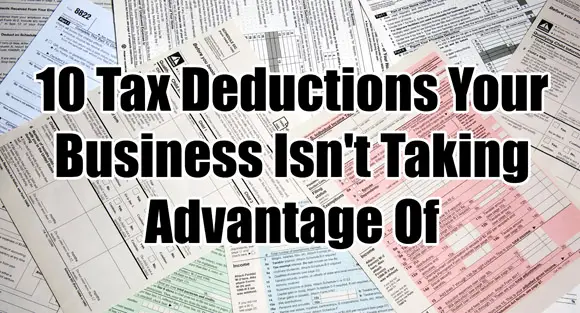When it comes to tax season, one of the most effective strategies to keep more of your hard-earned money is to take full advantage of the tax deductions available to you. However, with the complexity of tax laws and the sheer number of potential deductions, it’s easy to overlook some valuable opportunities to reduce your taxable income. By understanding and utilizing the best small business tax deductions, you can significantly lower your tax burden, freeing up resources to reinvest in your business and fuel its growth.
In this blog, we’ll explore ten often-overlooked tax breaks for small business owners, ensuring that you’re not leaving any money on the table when it’s time to file your taxes
What Are Tax Deductions and Why Should Businesses Take Advantage of Them?
Tax deductions are expenses that you can subtract from your taxable income, thereby reducing the amount of income that is subject to tax. For small business owners, understanding and utilizing tax deductions is crucial. These deductions lower your overall taxable income, which can lead to significant savings. Essentially, by identifying what can be claimed as business expenses, you’re able to reduce the amount of money the government can tax, allowing you to keep more of your hard-earned profits within your business.
Small business tax deductions, or deductible business expenses, include a wide range of costs associated with running your business. By taking full advantage of these deductions, you can reduce your tax liability, which in turn allows you to reinvest more into your business, cover business expenses, and ultimately support growth. Additionally, staying informed about the best small business tax deductions ensures that you’re not leaving money on the table when tax season arrives
1. Bank Fees.
Many businesses overlook this deduction when it comes to tax time. If you pay a lot of fees with your PayPal or bank account, start keeping track because you can deduct them.
2. Food and Groceries.
If you bought food for clients, you can deduct the expense. In addition, if you require an employee to work more than ten hours in a day, you can write off that employee’s dinner as well. As an entrepreneur, though, you can’t write off your own meal.
3. Dining Out.
You can deduct your dining costs if you discussed business at the meal and documented it. In that case, it’s considered “meals and entertainment,” and you can deduct 50%.
4. Travel, Meals, Entertainment, and Gifts
If you travel for business, you can deduct hotel fees, airfare, train tickets, bellboy tips, dry cleaning, rental cars, and more. All your travel costs are 100% deductible except for dining out (you can only deduct half of your meal costs while traveling).
5. Home Office.
Some business owners think that deducting a home office is basically inviting the IRS to audit you, but that’s not true as long as you follow the rules. You can only deduct a home office if the space is devoted to your business and nothing else.
6. Vacations.
Technically, you can deduct a vacation if there’s business intent in the trip. For example, if you go to Disney World for a conference and your family stays with you in the hotel room, you can deduct your own travel costs plus the cost of the room. You can’t, however, deduct your family’s Disney tickets.
7. Mileage.
If you travel for your business, keep track of the dates, mileage, tolls, and parking costs associated with your trips. If you lease your vehicle, you can also add in your lease payments, just as you can factor in the interest on your loan and depreciation on your vehicle if you are buying the car. Just keep in mind that if your business is not home-based, you can’t actually deduct your drive to and from the office. Your deductible mileage starts at your first business-related destination and ends at the last one.
8. Office Supplies.
Office supplies like computers, cameras, printers, and printer supplies, pens and pencils, software, postage, web hosting, and other supplies and fees can all be deducted. Just be sure to save your receipts!
9. Moving Costs.
If you move for business-related reasons, you may be able to deduct some of your costs. However, your move must be at least 50 miles away from the address that is your “tax home,” and you have to live there for at least 39 weeks during your first year of employment (if you’re self-employed, it’s 78 weeks).
10. Phone Charges.
If you make calls for your business from home, you can deduct those expenses. When you get your phone bill, just be sure to circle your business-related calls so you can total them up. Remember, though, regular phone fees and charges won’t count toward your deduction unless you have a second line installed specifically for business use.
Additional Tax Deduction Ideas
The following deductions are more common but no less important.
Insurance Premiums
Insurance is a necessary expense for most businesses, whether it’s health insurance, liability insurance, or workers’ compensation insurance. These premiums are often tax-deductible, providing a valuable tax break for small business owners. Be sure to track all your insurance payments, as they can significantly reduce your taxable income.
Retirement Contributions
If you contribute to a retirement plan, such as a SEP IRA or a SIMPLE IRA, those contributions are tax-deductible. This is not only a great way to save for your future but also an effective method to reduce your taxable income today. Small business owners should consider setting up retirement plans that benefit both the company and its employees, offering both a tax deduction and a retirement savings vehicle.
Advertising and Marketing
Expenses incurred from advertising and marketing your business, such as website development, social media ads, and printed materials, are all deductible. These costs are crucial for growing your business, and they can be claimed as business expense tax deductions, further lowering your taxable income.
Professional Services
Fees paid to lawyers, accountants, consultants, and other professionals for services rendered to your business are deductible. These services are often necessary for maintaining legal and financial compliance, making them legitimate business expenses that you can deduct.
Depreciation
If your business has significant assets, such as equipment or property, you can deduct a portion of their cost each year through depreciation. The actual expense method allows you to spread the cost of an asset over its useful life, which can help you manage your taxable income over time. This deduction can be especially valuable for businesses with large capital investments.
Maximize Your Savings with Smart Tax Deductions
Taking full advantage of the available small business tax deductions is not just a smart move — it’s essential for optimizing your financial strategy. By understanding what can be claimed as business expenses and ensuring that you’re not missing out on any deductible business expenses, you can reduce your taxable income, increase your cash flow, and reinvest more into growing your business.
As tax season approaches, review all possible deductions, from the more commonly known ones like office supplies and travel expenses to the often-overlooked deductions like education, insurance premiums, and professional services. By doing so, you’ll be better prepared to maximize your tax breaks for small business owners and ensure that your business remains financially healthy. Remember, the goal is to save money on taxes and strategically use those savings to cover business expenses and foster long-term growth.

